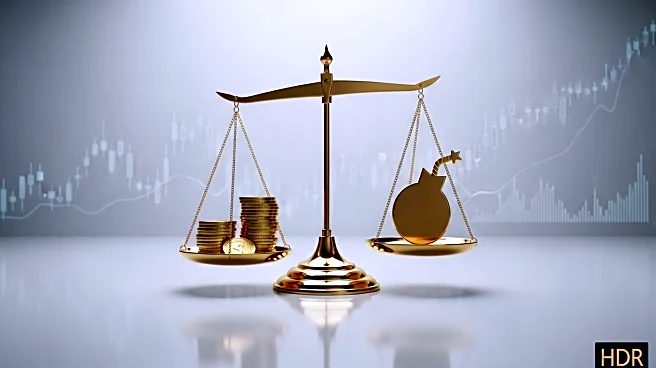What's Happening?
The Russian economy is experiencing a significant slowdown, primarily due to the Kremlin's extensive military spending in the ongoing conflict with Ukraine. This economic deceleration is compounded by a targeted drone campaign by Ukrainian forces, which has disrupted up to 17% of Russia's refining capacity, leading to fuel shortages and price hikes. The Russian government has been heavily investing in defense, with spending reaching 41% of the national budget in 2025, the highest since the Cold War. This has resulted in increased wages and benefits to attract military volunteers, particularly affecting Russia's poorer regions. However, this influx of cash has distorted labor markets and driven inflation to nearly 10%, prompting the Central Bank to raise lending rates. The economic slowdown is evident as GDP contracted by 0.6% in the first quarter of the year, marking the first decline since 2022.
Why It's Important?
The economic challenges facing Russia have significant implications for its domestic stability and international posture. The slowdown threatens to erode public support for the war in Ukraine, as economic hardships become more pronounced. High inflation and potential tax increases could further strain the Russian populace, leading to decreased living standards and purchasing power. For the Kremlin, maintaining economic stability is crucial to sustaining its military efforts and political control. The situation also highlights the broader impact of international sanctions and the strategic importance of oil prices in Russia's economic resilience. If economic conditions worsen, Russia may be forced to reconsider its military strategies or seek diplomatic resolutions to mitigate financial pressures.
What's Next?
As the Russian economy continues to face challenges, the government may need to implement further fiscal measures, such as tax hikes, to address budget deficits. The potential for increased unemployment could drive more individuals to enlist in the military, given the attractive wages and benefits. Internationally, Russia's economic trajectory will depend on oil market dynamics and the effectiveness of sanctions. Should the economic situation deteriorate further, it could lead to a shift in Russia's approach to the conflict in Ukraine, possibly opening avenues for negotiation or a reduction in military activities.
Beyond the Headlines
The economic slowdown in Russia underscores the complex interplay between military ambitions and economic sustainability. The prioritization of defense spending over civilian needs raises ethical questions about governance and the long-term welfare of the Russian population. Additionally, the situation highlights the vulnerabilities of economies heavily reliant on natural resources and the geopolitical risks associated with military conflicts. The potential for stagflation or recession poses a significant challenge to Russia's economic model and could have lasting effects on its global economic standing.












